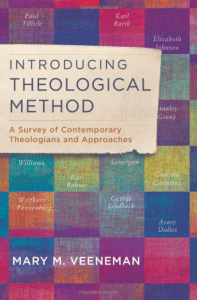 In her new introduction to theologians and their methods book, Introducing Theological Method: A Survey of Contemporary Theologians and Approaches, Mary Veeneman, contends we need to ask three questions about how theology is done — and she’s right.
In her new introduction to theologians and their methods book, Introducing Theological Method: A Survey of Contemporary Theologians and Approaches, Mary Veeneman, contends we need to ask three questions about how theology is done — and she’s right.
We need books like this that describe how theologians do their theology, and we need books that distinguish one’s method from another’s method.
1. What are the primary sources for theological reflection? Some theologians will argue that the biblical text alone should inform theological work. Others will argue that creation itself or philosophy and the natural and social sciences are important sources for theological work. Some theologians will argue that the Christian tradition should inform theological work, while others will advocate a theology that explicitly avoids a consideration of the tradition. 2. What questions should a theologian answer? Some theologians argue for a standard set of questions, while others argue that the questions should arise from the contemporary context. 3. What is the starting point of theological work? For example, some of the theologians studied in this text will be very concerned with the contemporary situation in specific contexts, while others will look to universal human experience. Other theologians will argue that God or the biblical text, apart from human context, must be the starting point for theological reflection.
This book will introduce the reader to some of the most important theologians of the twentieth century, including Karl Rahner, Karl Barth, Paul Tillich, Avery Dulles, and George Lindbeck. It will also give careful attention to liberation and feminist theologies, evangelical theologies, Mennonite theologies, and comparative theology. Each section will consider the thinker’s background, underlying assumptions, use and interpretation of sources, and driving questions. This book will not advocate for a particular theological method. Rather, it will advocate having a conversation about method and becoming more aware of one’s own background, underlying assumptions, use and interpretation of sources, and driving questions.
Stanley Grenz and Roger Olson open their book Who Needs Theology? by stating that everyone is a theologian. The statement that usually follows this kind of assertion is that the only remaining question is whether one is a good theologian. Similarly, everyone has a theological method, even if that method is not explicitly known. The only question is whether one employs a good method. This book is^intended to help the reader become a better theologian by developing a good theological method.











